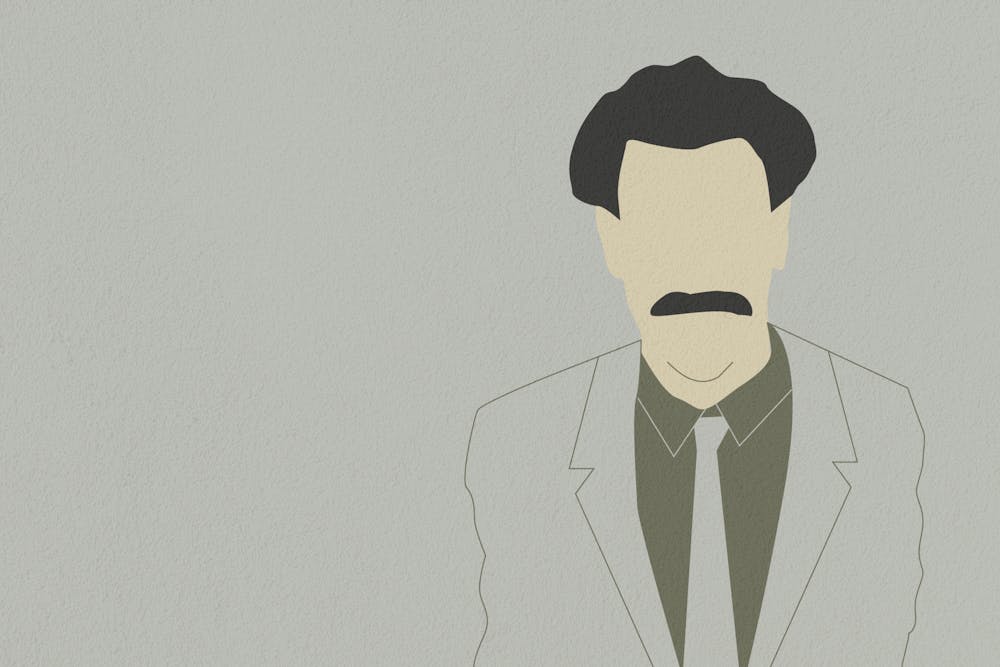Between COVID–19 and the presidential election, 2020 has been full of surprises. The past few months have been full of troubles and anxiety, from the transition to online learning and election concerns to health scares surrounding the coronavirus. Suddenly, 2020 delivered another surprise: Borat Margaret Sagdiyev.
Borat, a fictional satirical character created by Sacha Baron Cohen, stole the hearts of millions in the 2006 mockumentary comedy film, Borat: Cultural Learnings of America For Make Benefit Glorious Nation of Kazakhstan, where the Kazakh reporter and television personality sought to make a documentary about American society and culture. Borat Subsequent Moviefilm (2020), shot in secret and released this October, finds Cohen donning the grey suit once again, with the titular character seeking redemption for bringing shame to the nation of Kazakhstan through his antics in the first film. Unfortunately, Borat Subsequent Moviefilm just doesn’t deliver to the level the original comedy film did.
Sacha Baron Cohen is still his usual self in this film, but it doesn't misses mark of the original Borat, or even some of Baron Cohen’s other signature satire personalities, like Brüno or Ali G. As a big fan of Cohen’s satirical comedy style, I had very mixed feeling about this film. Ultimately, while there are drawbacks in its focus and comedy, Borat Subsequent Moviefilm is still a fun testament to the current American sociopolitical climate, intertwining current events and unsuspecting prank victims with the onscreen personality of Sacha Baron Cohen and his breakout co–star.
For this film, Borat must bring a gift to VP Mike Pence in hopes of casting Kazakhstan back into the good graces of the United States and their leader, President “McDonald” Trump. This mission sets Borat on course for a very different America than the one he learned about back in 2006, one that is now grappling with a global pandemic and a divided nation. Throughout the film, Borat is introduced to the modern technologies endemic to a westernized society in 2020, like iPhones and fax machines.
Sequences like these are reminiscent of the original cultural learnings that Borat’s naive personality tortured individuals with in 2006’s Borat, like the iconic sequence where Borat tries to learn how to tell a “...NOT!” joke. However, these scenes quickly diminish in frequency after the opening sequences, with the film becoming much more plot–driven afterwards. Borat’s iconic “Wawaweewa” expression of approval sticks, but not much else of the clueless charm that audiences grew to love about the character.
What does stick within this film is that Sacha Baron Cohen isn’t afraid to push the boundaries in his pranks. He follows the formula of staging pranks on some of the most unsuspecting—and at times, appalling—examples of American citizens. The actor willingly puts himself into danger, from crashing the Conservative Political Action Conference, to leading racist sing–a–longs deep in Trump Country. However, this is precisely where the film loses focus.
“Borat” is way too recognizable in the US, leading him to disguise himself heavily. The disguises and subsequent prank victims that are filmed make the sequel seem more like Cohen’s Trump–inspired satire television series, Who Is America? The overtly political nature and aim of the film undermines some of its comedy, even when the pranks target high–government officials or celebrities. The Mike Pence prank, advertised as the movie’s biggest component, was over in a matter of seconds; the majority of it can be seen in the film’s trailer.
The film is really defined by its breakout co–star, Maria Bakalova, who plays Borat’s daughter, Tutar. Tutar fantasizes about being married to a wealthy, older man, idolizing Melania Trump. Bakalova’s comedic performance really shines and offers a change of pace from Borat’s usual humor palette, as well as a new perspective for character exploration within the film’s pranks.
Her character’s cluelessness upon arriving in America harkens back to the original humor from Borat (2006), and it was even more impressive given that this is Bakalova’s first major role. She readily took up the challenge of co–starring with the satirical genius Cohen, and their chemistry was present throughout the entire film. From facing a social media influencer who tells her that women have to be “weaker nowadays,” to literally pranking Rudy Giuliani, Bakalova bravely mirrored the situations that Baron Cohen readily faces in all of his roles, delivering a truly strong performance and convincing acting, even in close–up or long sequences.
All in all, while failing to live up to the original film, Borat Subsequent Moviefilm is the moviefilm that the world needs right now. In an age of bad news and doomscrolling, it’s refreshing to see someone like Cohen search for ways to make us laugh while still keeping in mind America’s prevalent issues. This film takes a very shitty year, and a series of very shitty situations, and brings them to the forefront through an entertaining lens. Sacha Baron Cohen released this film to highlight the current political climate of America, and it's a worthwhile way to spend 95 minutes.







